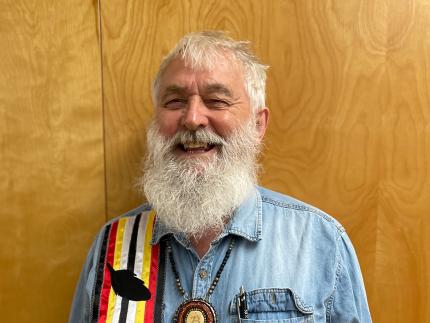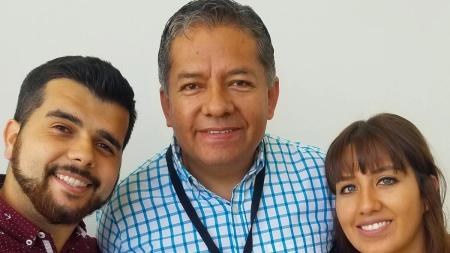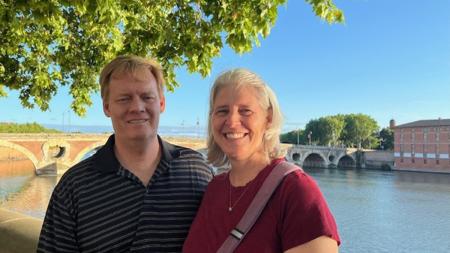32 Years of Faithful Ministry

After 32 years of dedicated ministry with the Indigenous Christian Fellowship (ICF) in Regina, Sask., commissioned pastor Bert Adema is retiring. His decades of service have left a lasting legacy of compassion, creativity, and reconciliation — not only in Regina but also across the Christian Reformed Church in North America (CRCNA) and its Indigenous ministries.
Adema began his journey with ICF in 1993, moving with his family to Regina after several years of serving with World Renew in Sierra Leone. Adema and his wife decided to return to Canada for the education of their children. After some time spent volunteering with CRCNA ministries, Adema was encouraged to apply for the ICF director position.
Adema’s experiences brought a unique cross-cultural understanding to his work and fostered a deep appreciation for contextualizing the gospel. His time abroad also equipped him with a nuanced understanding of intricate societal issues, which has been instrumental in addressing the pressing realities of addiction and poverty within ICF’s surrounding community.
Before driving across the country to take on the role, Adema visited sister organizations in Winnipeg, Man., and Edmonton, Alta., and connected with Indigenous ministries across southern Ontario. His first day as director at ICF was June 5, 1993. Under his leadership, ICF, which was started by the Christian Reformed Church in 1978, transitioned from its original location to its current home (three blocks away) in 1995 — a move that led the ministry into a new chapter of growth and community outreach.
Reflecting on his three decades of ministry, Adema shared that he is most proud of having served as “an ally-advocate for Indigenous people.” Adema has led with a deep commitment to walking alongside others. “We couldn’t do everything,” he reflected, “but we kept trying.”
Under his leadership, ICF has become a place where community members, volunteers, and partners have come together — not just to worship but also to share meals, create art, advocate for justice, and celebrate Indigenous identity. It has been a ministry built not on hierarchy but on relationship and mutual respect.
Among the many initiatives Adema has championed, several stand out. He helped establish the John School program in Regina — a justice initiative aimed at reducing demand for street-level prostitution by educating men who had been charged by law enforcement as “johns.” With small class sizes and a focus on honest dialogue, the program saw a significantly lower recidivism rate in Regina as compared with other cities.
Adema also emphasized the importance of art as a bridge for understanding and healing. Under his leadership, ICF commissioned five major artwork series, including murals and installations by Ovide Bighetty and Laurissa Kitchemonia. These works went on a cross-Canada tour and are also displayed in and around the ICF building. The art proclaims the beauty of Indigenous culture and offers a visible sign of hope and community pride in Regina’s North Central neighborhood — an area often stigmatized in public discourse.
One of Adema’s fondest memories, he said, is the “reForming Relationships” art tour that went coast to coast over a period of four years. Adema noted that it brought Indigenous and non-Indigenous people together, speaking to and supporting reconciliation in a beautiful way.
Adema identified the worsening conditions of addiction and poverty within the local community as the most significant changes he has observed since he started working with ICF. Increased access to highly dangerous substances such as fentanyl have resulted in more overdose deaths than in the past, for example. In response, ICF served the community by providing spaces for wakes and funerals. In 2014 the ministry hosted 20 funerals.
Adema also highlighted significant changes he has seen in Canada since the closing of the last residential school, and since the 2008 apology made to residential school survivors. Adema suggests that no longer denying the legacy of residential schools became a “turning point toward healing for Indigenous people.”
A ceremonial garden, dedicated in September 2023, is another testament to the integration of Indigenous spirituality and Christian practice at ICF. “It’s a place of beauty,” Adema said, “created by friends of the Indigenous Christian Fellowship and staff and volunteers, right here in a neighborhood that’s been described as the worst in Canada. That’s pretty cool.”
Adema’s quiet, steady presence has created a space where people have felt seen, valued, and welcome — no matter where they come from. Laura Lee Madsen, first a community member and now a staff member at ICF, described it as “an amazing environment . . . devoted to the community and helping all different kinds of people.”
Her own journey with ICF began through a simple encounter but quickly turned into something much deeper, she said — a place of belonging. “Inside the building, I felt happier,” she shared, “because I was just around people who were normal and good.”
Adema’s ministry has been deeply supported by his family and by the CRCNA community coast to coast. He credits champions such as Ari Van Eek, who advocated for Indigenous ministries as early as the 1970s, and a succession of denominational leaders who affirmed that Indigenous ministry is central to the church’s faithfulness in the Canadian context.
Adema notes that “since 1978 the CRC has blessed the ministry greatly.” The CRC’s commitment to ICF’s physical assets and staffing has been an important part of having such an active ministry in Regina. “I am grateful to the Creator and the many people who supported the ministry during the past decades with prayers, volunteer support, and donations. Their contributions have made so much possible,” he said.
Adema said he is grateful too that in spite of many challenges, support for Indigenous ministry in Canada remains robust, and he considers that an important part of persistent Christian involvement in justice.
“If we want to be faithful,” he said, “we need to work on Indigenous ministry. We need to work on that treaty relationship that mirrors our covenantal relationship. Treaty is covenant — and we are all treaty people.”
As Adema steps into retirement, he leaves behind a flourishing ministry and a generation of people encouraged and inspired by his faithful service. The CRCNA is grateful to God for his many years of passionate, humble, and justice-seeking leadership.
__
Do you know someone who would be a good fit for taking on leadership at the Indigenous Christian Fellowship? Encourage them to apply today!


